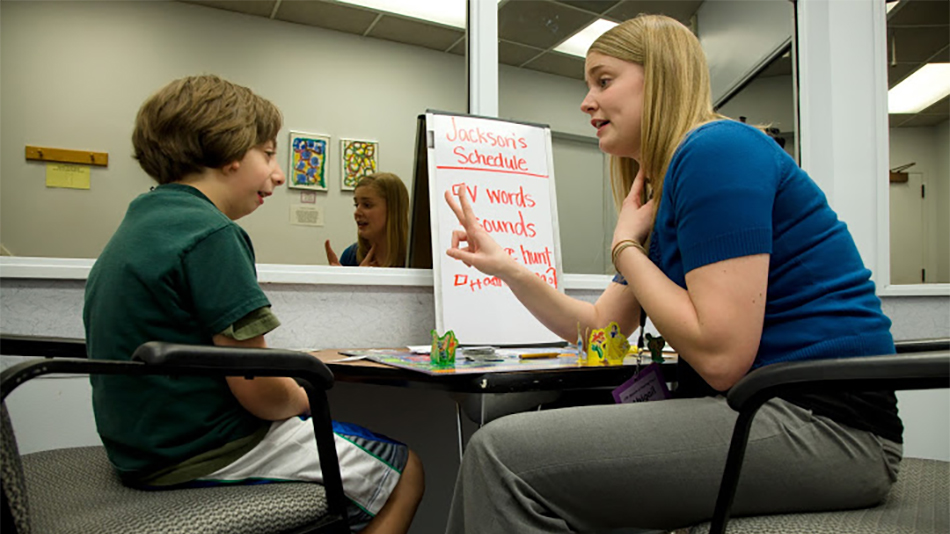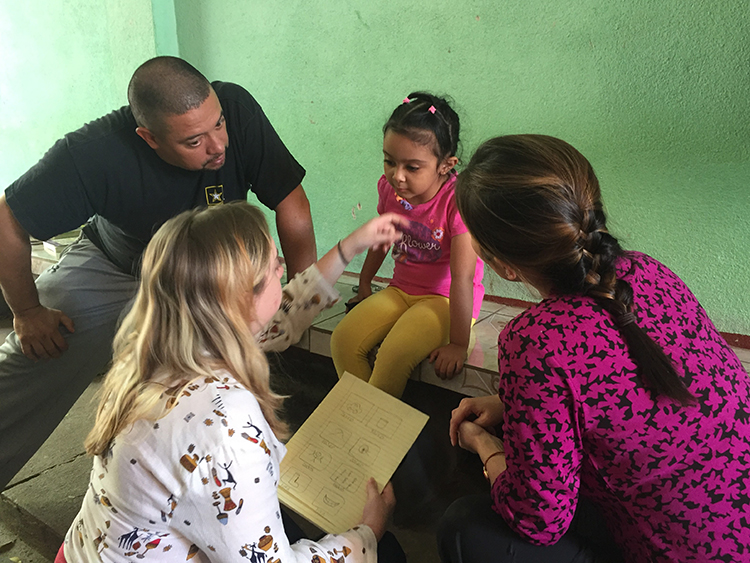
The field of speech and hearing sciences involves the study of all aspects of typical and impaired human communication. The Department of Speech and Hearing Sciences is committed to understanding the fundamental mechanisms involved in processes of speech, language, hearing, swallowing, and their disorders, and to improving the quality of life for individuals affected by communication and swallowing disorders across the lifespan.
VISIT DEPARTMENT WEBSITEHIGHLIGHTS
The Department of Speech and Hearing Sciences’ graduate program was ranked number five in Speech-Language Pathology in the most recent rankings of U.S. News and World Report (2025).
77
Undergraduate majors
EDUCATION
The Department of Speech and Hearing Sciences offers a Bachelor of Science in Speech and Hearing Sciences, a Master of Science in Speech-Language Pathology (Clinical Research), a Master of Science in Educational Speech-Language Pathology, a Master of Science in Medical Speech-Language Pathology, a Doctor of Philosophy, and a Certificate in Speech, Language, and Hearing Foundations. The Master of Science degree programs are accredited by the Council on Academic Accreditation in Audiology and Speech-Language Pathology (CAA).
Doctoral students have also competed successfully for Ruth L. Kirschstein National Research Service Awards from NIH, and scholarships from the National Science Foundation, the American Academy of Audiology, and the American Speech-Language-Hearing Association.
Students
Autumn 2025
- 77 Bachelor of Science (BS) students
- 107 Master of Science (MS) students
- 14 Doctor of Philosophy (PhD) students
Degrees Awarded
2024 - 2025
- 47 BS degrees
- 52 MS degrees
- 3 PhD degrees
Student Honors
2024 - 2025
- 1 WSHLA Graduate Scholarship
- 2 UW Graduate School Top Scholar Awards
- 1 UW GSEE Graduate Supplemental Award
- 3 Partnership for Interdisciplinary Early Childhood Educators and Speech-Language Pathologists (PIECES) Scholars
- 1 Leadership in Neurodevelopmental & Related Disabilities (LEND) Scholars
- 2 SLP Public Schools Awards
- 2 Scottish Rite John D. Blankenship Awards
- 3 Opal Hicks Graduate Scholarships
- 4 Non-Resident Educational SLP Tuition Scholarships
- 2 Medical SLP Scholarships
- 2 Speech & Hearing Graduate Scholarships
- 1 Speech & Hearing Sciences Fellowship
- 1 Phillip Yantis Endowment Fellowship
- 1 Katy Straalsund Endowed Memorial Scholarship
- 1 Carrel-Miner Clinical Achievement Award
- 1 Siva Undergraduate Achievement Award
- 1 Ralph Leonard Achievement Scholarship
- 1 ASHA SIG 3 Affiliation Winner
- 1 ASL Honor Society Laurent Clerc Medal
- 1 Segal AmeriCorps Education Award
- 6 Mary Gates Scholar Awards
- 1 Purple and Gold Scholarship
FACULTY

Autumn 2025
- 6 Professors
- 2 Teaching Professors
- 3 Associate Professors
- 5 Associate Teaching Professors
- 2 Assistant Professors
- 2 Assistant Teaching Professors
- 7 Lecturers, part time
- 1 Research Professor
- 1 Research Associate Professor
- 1 Research Assistant Professor
- 9 Adjunct Faculty
- 9 Affiliate Appointments
- 19 Emeritus Faculty
- 13 Clinical Associates
Faculty honors include:
- American Academy of Arts and Sciences Fellows
- American Institute of Physics Gold Medal
- Acoustical Society of America (ASA): President; Fellows; Silver Medal
- American Speech-Language-Hearing Association (ASHA): Presidents; Board of Directors; Fellows; Honors of the Association
- American Speech and Hearing Foundation (ASHFoundation): Presidents; New Investigator Award; New Century Scholar Research Award
- American Philosophical Society Karl Spencer Lashley Award in Neuroscience
- IPSEN Foundation’s Jean-Louis Signoret Neuropsychology Prize
- University of Washington: Distinguished Teaching Award; David B. Thorud Leadership Award; William P. & Ruth Gerberding Professor; Marsha Landolt Graduate Mentor Award
- Washington Speech-Language-Hearing Association (WSLHA): Presidents; Board of Directors; Clinical Achievement Awards; Honors of the Association
- Washington Research Foundation Ronald S. Howell Distinguished Faculty Fellowship
- NOMIS & Science Young Explorer Award
- National Student Speech Language Hearing Association (NSSLHA) Honors
INTERDISCIPLINARY RESEARCH
The Department of Speech and Hearing Sciences has many ties with other disciplines at the UW and beyond. A few examples:
- Several SPHSC faculty have clinical appointments and laboratory space in the UW’s Institute for Human Development and Disability (IHDD); SPHSC graduate students in speech-language pathology fulfill part of their curriculum requirements during clinical rotations at the IHDD.
- The UW Autism Center, directed by an SPHSC faculty member, is an interdisciplinary clinic, research, and training facility with faculty from three UW Schools and Colleges.
- SPHSC and the College of Education collaborate on research on social communication in the Experimental Education Unit (EEU)—a model demonstration school that provides integrated classrooms for nearly 200 infants, toddlers, and young children with disabilities and their typically developing peers.
- Eleven SPHSC faculty members are affiliate professors and one is on the board of advisors at the Virginia Merrill Bloedel Hearing Research Center. The Bloedel Center, in the UW School of Medicine, is the largest hearing research group in the U.S.
- The Institute for Learning and Brain Sciences (I-LABS), co-directed by an SPHSC faculty member, is an interdisciplinary research center that draws research faculty from SPHSC and other departments across five UW schools and colleges.
Areas of Research Include:
- Acquired Language Disorders
- Adult & Pediatric Audiology
- Aphasia
- Auditory Development in Infants & Children
- Auditory Assessment & Electrophysiology
- Auditory Attention & Neuroscience
- Auditory Perception
- Augmentative & Alternative Communication (AAC)
- Cognitive-Communication Disorders
- Cognitive Neuroimaging
- Autism Spectrum Disorders
- Language Development & Disorders in Children
- Motor Speech Disorders in Adults
- Stuttering, Fluency & Sensorimotor Control
- Social Communication
- Speech Development, Perception & Production
- Voice Disorders in Adults & Children
OUTREACH
Department faculty and students take part in a number of local, state, national, and international outreach activities that include:
- Working with preschools and elementary schools in western Washington to screen children for hearing loss, as well as speech and language delays and disorders.
- Developing, with the Washington Corrections Center for Women, “The Partnership for Healthy Parenting” program for Washington state incarcerated women who are mothers with newborn children to facilitate early communication development and parenting skills.
- Directing the “Healthy Hearing” program through the Special Olympics Washington Health Athlete Initiative, screening athletes annually for permanent medically significant hearing loss.
- Providing community-based support groups for individuals with developmental and acquired neurologic communication disorders and their families and caregivers. Through our on-campus clinic and in the community, we focus on helping individuals and families navigate life through educational sessions, access to local experts in the community, transitional life skills development, and opportunities to share with others with similar life experiences.
- Offering a Hearing Aid Assistance Program (HAAP) to those in our community who are otherwise unable to obtain services and hearing amplification due to financial limitations, which also provides a clinical learning environment. Our clinic also serves as the state-wide hearing aid bank to recycle and reuse donated hearing aids.
- Implementing a Communication for Life (CFL) program for young adults with developmental disabilities, with weekly classes focused on communication skills critical for the transition from high school to adulthood. The program focuses on several functional themes: vocation, health, safety and self-advocacy, social life, and leisure.
- Organizing annual fundraising events to support our Uncompensated Care program within the UW Speech and Hearing Clinic, which supports the needs of individuals and families in our community and provides clinical learning resources.
- Collaborating annually with the philanthropic organizations “Hearts in Motion” and “Healing the Children” to bring much needed adult and pediatric speech, language, swallowing, and audiology services to underserved areas in Central America.
CONTACT
Department of Speech and Hearing Sciences
1417 NE 42nd Street
University of Washington
Seattle, WA 98195
(206) 685-7400
website: depts.washington.edu/sphsc
last update: December 2025